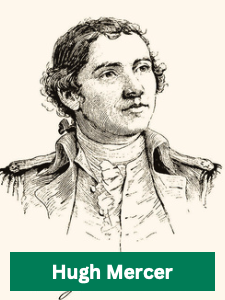Mercer: Behind the Name
Hugh Mercer was born on January 17, 1726, in Aberdeenshire, Scotland. He was heavily shaped by his education at the University of Aberdeen where he earned a degree in medicine. He would later use this education to become a remarkable physician and courageous soldier. Hugh served as an assistant surgeon with Jacobite forces during the pivotal Battle of Culloden in 1746. Afterwards, Mercer fled Scotland to escape persecution and found a new home in Pennsylvania.
In Fredericksburg Virginia, Mercer quickly became a renowned physician, for both his skill and his innovative approach to treating battlefield injuries and illnesses. His blending of traditional Scottish remedies with cutting-edge medical techniques of his time led to a successful career in medicine. His strategic brilliance was put on full display during the French and Indian War; where he quickly was given the rank of colonel under General Edward Braddock. Mercer was a passionate supporter of American independence; he was also a trusted friend of George Washington. Mercer would eventually serve as a brigadier general in the Continental Army. During the Battle of Princeton in January 1777, Mercer displayed heroic courage, however he suffered fatal wounds while rallying his troops against the British. Though Hugh Mercer had treated many soldiers who had been wounded on the battlefield, he could not save himself from his own injuries.
Mercer's unwavering commitment to liberty left a profound legacy in American history. Today, his memory is preserved through statues, memorials, and the naming of Mercer County—found in seven other states: Illinois, Kentucky, Missouri, North Dakota, Ohio, Pennsylvania, and West Virginia. To honor his enduring spirit, the Mercer Oak at Princeton Battlefield State Park stands as a living symbol of his heroic contribution during the nation’s 250th anniversary, inspiring new generations to remember the heroism that helped shape our freedoms.

